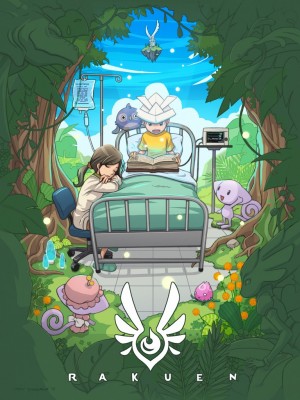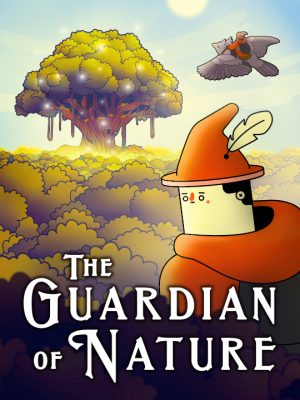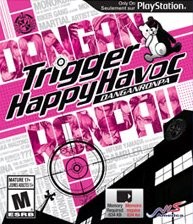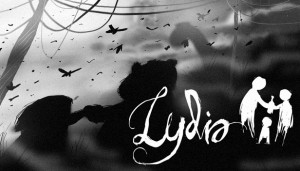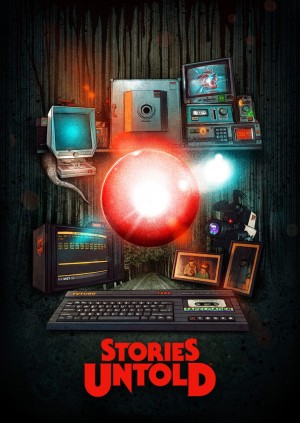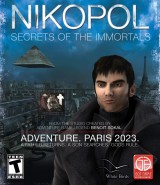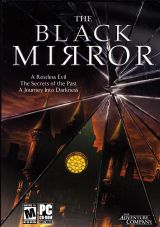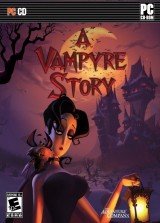Review for Rakuen
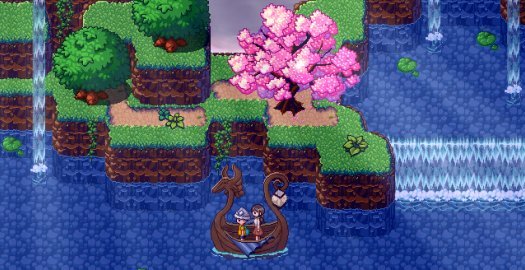
It doesn’t take much for a game to make me cry. Heartfelt goodbyes, declarations of love, poignant scenes with dogs—if a game has any of these, pass the Kleenex. It goes without saying that if a beloved character dies, I’ll be a wreck. Frankly, I like it that way. The more tears I shed, the more I like the game… usually.
Strictly judging by number of Kleenex used, Rakuen should be my pick for game of the year. And it’s not only a tearjerker—this fantasy adventure from first-time developer Laura Shigihara also made me smile a lot. Rakuen is a lovingly crafted indie game with a touching premise and great music, but aspects of it left me dissatisfied. When I try to articulate what I didn’t like about it, though, I feel like a horrible person. How can you criticize a game about a boy dying in the hospital?! Buckle your seatbelts, we’re about to find out.
In Rakuen, you play as a curious, unnamed Boy suffering from a serious illness that’s hinted at but never outright stated. He’s sharing a hospital floor with a comatose woman whose husband won’t leave her side, an angry old man who never has visitors, a man suffering from dementia, and a bedridden girl who desperately misses her best friend. During his hospital stay, the Boy’s mother has been reading to him from "Rakuen", a fantasy book about a young warrior who returns home to Morizora Forest to find his entire tribe has disappeared. The warrior goes to the spirit Morizora to ask for a wish: to ride Morizora’s enchanted boat to the paradise world of Rakuen, so he can rejoin his people.
As it turns out, this is more than a comforting bedtime story. Morizora Forest is a real place populated by cat-like creatures called Leebles, and there happens to be a portal to this fantasy world inside the hospital. Once the Boy finds the portal, he’s able to travel between the bleak hospital and cheerful fantasyland of Morizora Forest, where his fellow patients all have doppelgangers among the Leebles. By helping these fantasy people, he provides closure for their human counterparts and helps them find peace. The idea that he’d help them “just because” is consistent with the Boy’s optimistic and friendly personality, but this altruism isn’t totally selfless—ultimately, he hopes to wake up the sleeping spirit Morizora so he’ll be granted a wish for his trouble.
Rakuen has a lot of surface similarities to another pass-the-Kleenex game, To the Moon. Both were made with the RPG Maker engine, with an aesthetic reminiscent of a 16-bit Japanese role-playing game (JRPG). Both stories require uncovering past regrets to resolve present conflicts, with lives hanging in the balance. Music also plays a central role in both games—in fact, as the composer and singer of To the Moon’s main theme, Laura Shigihara’s contribution was one of that game’s strengths. So comparisons between the two are inevitable, and as much as I’ve tried to approach Rakuen objectively, I can’t dispute that one of my disappointments is that I didn’t like it as much as To the Moon. That’s certainly a bias on my part, but I can’t separate it from my impressions.
One major difference between the two games is that while To the Moon is primarily story-driven, Rakuen is full of real, adventure game-style puzzles. My initial playthrough took almost eight hours, and the puzzles had a lot to do with this. The problem is, the bulk of Rakuen’s puzzles just aren’t very interesting. There are an awful lot of fetch quests, crate pushing to get into blocked-off areas, and flipping of switches to drain or fill waterways preventing access to an item you need. I’d expect such bare-bones puzzles in a JRPG’s side quests, but in a role-playing game those side quests would take a backseat to combat. Here the puzzles make up most of the gameplay. They pad the game length’s rather than move the story forward, and much of the time I was anxious to get them over with. I gladly would have sacrificed 50% of Rakuen’s playtime for a tighter, more story-focused experience.
My impatience likely stems from the fact that Rakuen’s puzzles stand in the way of narrative progression—you need to get past a locked door to reach whatever’s behind it or ingratiate yourself to another character before they’ll give you the time of day, but the puzzles themselves rarely relate to the main story thread. For example, in one long sequence early in the game, you enter a cave with the goal of asking the spirit Morizora to grant you a wish. This goal is soon thwarted when, in the cave’s first room, you learn that the Leeble blacksmith has been separated from his tools. The tools are in a locked chest on the very same screen where you find him—you can see them from where you’re standing—but they’re unreachable due to water that has flooded the room. The blacksmith tells you that if you drain the water to reunite him with his tools, he’ll make you something you need to get through a blocked door to reach Morizora. Draining the water requires flipping two switches that are relatively nearby to the starting point, but you can only bypass the obstacles preventing you from reaching them by exploring the (rather large) cave and solving numerous little puzzles inside it.
In a sense, this setup is very adventure gamey. Traveling down a large puzzle chain only to open a locked door is something I’ve done in more adventures than I can count. But in Rakuen this sort of puzzle logic really frustrated me—possibly because I went into the game with the wrong expectations. I was eager to move on with the story and instead had to do a lot of arbitrary puzzle-solving to reach something I could plainly see all along. And then, frustratingly, during important story moments you often sit back and watch as things happen on their own. In other words, solving puzzles unblocks the path so you can proceed to watch something happen, rather than the puzzle solution causing the something to happen. Being blocked by puzzles feels different than solving puzzles to unlock story progression, especially in a game of this length. Cumulatively, they wore me down.
While the other patients’ backstories are uncovered during the Morizora Forest quests, the Boy’s own story is doled out through environmental breadcrumbs you’ll discover throughout the hospital. (In addition to his serious illness, he and his mom are contending with a recent family tragedy. Pass the Kleenex, again.) A lot of time in the hospital is spent opening lockers, bookshelves, and drawers—not that different than another tearjerker favorite of mine, Gone Home—but the simple graphical style makes this “exploration” feel repetitive. Enter any given room in the hospital and you’ll likely see a locker, a cabinet, and/or a bookshelf. Click it and the game will tell you what you found inside. An awkward interface that requires multiple rounds of clicks compounds the repetition: the first click often results in a message like “There’s a note here. Read it?” and you have to click again to proceed. When you’re doing this over and over, those clicks add up.
In fact, for all of the exploring you’ll do in Rakuen, there isn’t much sense of discovery. I blame this on the RPG-like interface. In an actual RPG, any cabinet could yield money, potions, weapons, armor, or items to help personalize your character’s skills and appearance. Because they serve to upgrade your character, simply finding these things sparks an a-ha! feeling in the brain. In an adventure game, where exploration is more story- or puzzle-driven, your findings should contribute to puzzle solutions or to your understanding of the world. (Ideally both!) To some extent this is true in Rakuen, since many of the items found in the hospital do provide clues to the Boy’s backstory, but they rarely gave me that a-ha! feeling. This could be an extension of the problem I had with the puzzles: because I wasn’t very engaged with the immediate non-story-critical goal, I just wanted to hurry through the hospital and get back to Morizora’s Forest.
As you progress through Rakuen, new areas of the hospital and Morizora’s Forest become accessible, culminating in a large area to explore with no convenient way to do it. Walking is done by holding down the arrow keys, which means your fingers get a workout as you move across each screen. You’ll end up with a few different portals between the hospital and the fantasy world, which help a little, but ideally I would have liked a map with a quick-travel option. The large cave I mentioned earlier does have a non-interactive map, but when I tried to use it I never ended up where I thought I should (probably because I didn’t understand how the flow between the cave’s upper and lower levels was being depicted). In another frustrating holdover from old-school RPGs, larger scrolling screens often have obstacles that you can’t see until you reach them, such as a rock blocking the path you hoped to use to exit to the next screen or an upper and lower level with no stairway connecting them.
Visually speaking, you may think Rakuen isn’t particularly ambitious from looking at the screenshots, but the graphics work hard within the confines of the 16-bit JRPG style. Dialogues are punctuated with expressive character close-ups, with the Boy’s cycle of facial expressions, from enthusiastic to concerned to scared, doing an excellent job of conveying emotion and endearing him to the player. The other human characters’ close-ups, while less varied, help portray the cutesy sprites on the screen as “real” people deserving of empathy. The graphics also draw the distinction between reality and fantasy, with the hospital depicted in sterile whites and grays compared to the lush greens, pinks, and blues of Morizora’s forest.
Not surprisingly, considering the designer’s background, Rakuen’s soundtrack is excellent. From Morizora Forest’s jaunty theme to the eerie music of hospital flashbacks, distinct compositions in different areas reflect the mood of that place and help establish the stark differences between the real and fantasy worlds. Laura Shigihara’s pedigree as a singer and composer (with some help from guest artists) shines in each of the unique songs capping off the Boy’s quests, even if the sudden vocals are a bit jarring in a game that’s otherwise all text. Initially sung by in-game characters to reiterate what just happened in the story, these songs reemerge near the end of the game as the other characters rally for the Boy who helped them—a little cheesy, but a nice way for the story and music to come together.
Rakuen is well written and often funny in ways I didn’t expect, from encounters with a grumpy onion to a formal tea party for a giant flower bud decked out in a top hat and monocle. For most of the game the Boy’s mother is by his side, providing gentle hints when asked, supporting his adventures, and protecting him when things get too scary. Their moving relationship is a highlight, especially considering how often mothers are dead or absent in fairy tale stories. I also loved the Boy’s exchanges with Sue, a bedridden little girl who has literally lost her marbles. (Not to be confused with Kisaburo, the dementia patient who has figuratively lost his…) Every time the Boy finds a marble in his travels and returns it to Sue, she lights up with an imaginative story about the magical world contained inside the marble, her temporary exuberance a stinging reminder of just how sick she is. Sweet moments like these add a strong human element to this fantastical story.
But as much as I enjoyed the writing, in the end Rakuen’s story let me down. It’s hard to explain why without spoilers, but the gist of my dissatisfaction is that the ending felt like it was designed to make the player cry without sticking to the rules of how the story had been set up. This isn’t a matter of “the ending was sad and I wanted it to be happy,” it’s a problem with how the Boy’s situation and his reason for seeking out Morizora are presented in the first place (or, at least, a problem with how I understood that setup). If this had been a shorter, more story-centric game, my disappointment in the ending may have been less profound. But after going through the motions to solve so many obstructive puzzles, I wanted to be wowed by the narrative experience, to really feel for these characters I’d come to know. Instead, I felt emotionally manipulated. (Fickle, huh? I want a game that makes me cry, and then when it does I complain that it didn’t make me cry the right way…)
Without question, Rakuen is an ambitious indie endeavor and I admired many aspects of it—the Boy’s authentic child-like wonder in the face of real human tragedy, the funny and endearing inhabitants of Morizora Forest, and the mystery surrounding the Boy’s hospital stay, to name a few. But my dissatisfaction with the puzzles and ending make the game difficult to wholeheartedly recommend. It really comes down to what kind of game you’re in the mood for. If you want a game that’s mostly story, then the number and type of puzzles in Rakuen will likely turn you off. If you’re looking for more of a story-puzzle balance regardless of how well the two are integrated, you’ll probably have a better time with Rakuen than I did. And if you’re in the mood for a game to make you cry—well, this one will, I guarantee it. I just can’t promise it’ll be the catharsis you’re looking for.
WHERE CAN I DOWNLOAD Rakuen
Rakuen is available at:
We get a small commission from any game you buy through these links (except Steam).Our Verdict:
Sweet, funny, and emotionally wrenching, Rakuen is an admirable indie project ultimately dragged down by obstructive puzzles and a disappointing ending.


